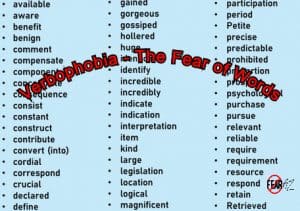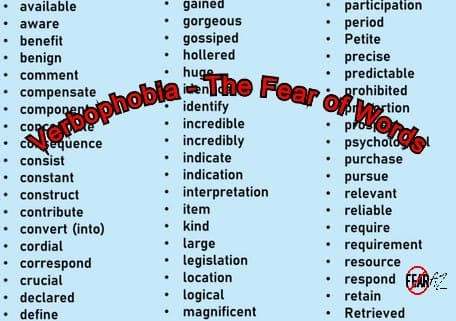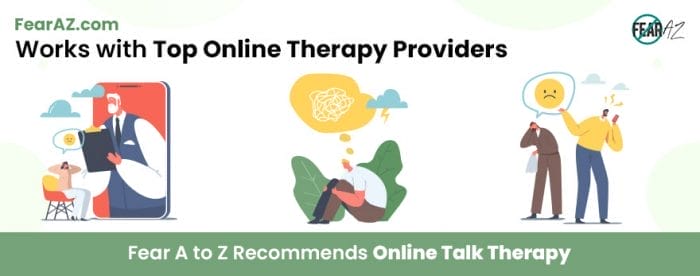Share This Article
No Words for Verbophobia
Do you fret about spelling, pronunciations, and translations? Does it cause you such a hard time that you prefer to altogether skip anything to do with words? You could be living with verbophobia, the excessive fear of words.
The extreme fear you feel on an everyday basis can be crippling.
You might sweat profusely when required to read words out loud. Or perhaps you stammer and stutter when you stare at the page. Public speaking, for you, must be a nightmare. What’s more, not everyone may understand it, and that makes it even harder for you to deal with it.
Is verbophobia real? Yes, very much so. But it’s also possible to live a verbophobia-free life. First, you need to determine the cause of your phobia, then work with that to treat the fear.

What Is Verbophobia All About?
Verbophobia is an inexplicable fear of words. It’s always there, like a nagging presence. It never leaves your side. You may get tongue-tied when you need to pronounce a certain word. Or, you hold your tongue when you need to speak.
Just the thought of certain words may trigger panic, let alone having to speak them. You might even find yourself avoiding movies with subtitles. While it may sound far-fetched, those living with verbophobia experience discomfort with words everyday. Words are everywhere. Speaking is an unavoidable necessity in a social world. Living with a fear of words is, therefore, a challenge.
Verbophobia is different from hippopotomonstrosesquippedaliophobia, which is the fear of long words. Verbophobia, or the abnormal fear of words, falls under specific word phobias.
Symptoms of Verbophobia
Like most other phobias, verbophobia symptoms can either be physical, mental, or emotional. Some of these symptoms are listed below:
Physical Symptoms
- Sweating
- Trembling
- Breathing difficulties
- Increased heartbeat rate
- Feeling disoriented
- Headaches
- Nausea and vomiting
- Tightness in the chest and chest pains
- Dizziness
- Confusion
- Fainting
Mental/Emotional Symptoms
- Uncontrolled anxiety in public
- Shame and guilt
- Feeling unworthy
- Sadness and hopelessness
- Fear of losing control
- Withdrawal
- Self-isolation and avoidance of going to public places.
- Depression
But What Are Some of the Verbophobia Causes?
Just like with other phobias, there’s no specific cause of the fear of words. The fear stems from a combination of many factors depending on the individual. Let’s take a closer look just a few of the possible causes.
Traumatic Childhood
How were your childhood years? Do you remember being laughed at in school for mispronouncing certain words? Do you remember being punished for misreading words? That may be the cause. The most likely age to develop verbophobia is during childhood years. The emotional turmoil that a child bears doesn’t leave them even in adulthood.
Genetics
Your genetics greatly influence your opinions, beliefs, and practices. Find out whether there is a history of verbophobia in your family. The problem could be hereditary. In addition, if you saw people around you struggling with certain words while growing up, you could end up with the same problem. This is because—other than school—children learn a lot from home.
Education
For those who didn’t finish school, it’s possible a lack of formal education is the root cause. Now, if you’re required to read words or speak in public as part of your job, you might shy away from those tasks due to shame or low self-esteem. You might have developed a fear of failure surrounding mispronunciations. If you didn’t finish school, it’s okay. Try not to let feelings of inferiority be a stumbling block to your success. If you think it will help, you might consider adult education programs. Your fear of words can be overcome.
Self-Care Tips for Verbophobia
Since we can’t live in a world without words, it’s important to seek treatment for verbophobia as soon as possible. Words can’t be ignored. More often than you think, you’ll be required to express yourself in public. Here are a few self-care tips you can practice to help you better manage your fear of words:
Try to Ignore Verbophobia
You can choose not to give too much attention to your fear. The more you think about verbophobia, the worse it gets. Choose to focus on other things that make you happy.
Apply Relaxation Techniques
Relaxation techniques go a long way in calming you down when tense. Practice controlled breathing and meditation each day. Before leaving home, breathe in and out for a particular duration of time. You’ll know the breathing is taking effect when you feel more relaxed and calm.
Get to Know Your Fear
Try to acquire as much information as there is about the abnormal fear of words. Read books and speak to experts in the field. The data you’ll acquire will set straight the fact from fiction. Some of this material was written by those who overcame the fear of words. How best to go about healing than to hear from someone who struggled with the same fear?
Talk to Someone
Find someone you trust to talk with. This could be a family member or trusted friend. Tell them precisely how words make you feel. Hopefully, they can offer you their support. In addition, you need others to encourage you in your journey to recovery. It would help if you had some outside motivation to stay on track.
Verbophobia is one of those phobias where practice can help to remove the problem. In your own space, practice reading. Mark your progress every day. In addition, you can have someone close help you practice. Ideally, this would be someone who wants nothing but for you to improve. It they offer critique, it should be positive.
You Can Also Seek Professional Help
In professional treatment, there are various methods which can help you overcome your fear of words. Some treatments may be combined to provide the best possible outcome for overcoming verbophobia.
Counseling
In counseling, you’ll talk with a trained therapist. The therapist will listen in a non-judgemental way to understand where your fear is coming from. They’ll guide you as you express your innermost thoughts and feelings. Your therapist will gradually help you identify and change unhelpful thought patterns.
Exposure Therapy
Exposure therapy involves guided exposure to the very thing triggering your phobia—in this case, words. With verbophobia, you’ll be exposed to reading and public speaking to alleviate your fear of words. Exposure therapy is a safe, controlled, and monitored therapy.
It takes time, but it’s worth it. The therapist may start you off by saying simple words out loud. The more you improve, the more the therapist will introduce you to more complex terms. At the end of your treatment, you should be able to better manage your fear of words.
How to Cope with Verbophobia Altogether
Simply determine the best way for you to treat your phobia. You can try a combination of treatments, or come up with a routine that suits you best. Either way, the best way forward is to make a firm decision regarding your phobia and deal with it.
Verbophobia Can Be Managed
Verbophobia can have far-reaching consequences. The fear can affect your confidence and even cost you jobs and opportunities. The best approach to healing is practice, counseling, and therapy. When well combined, you should be able to overcome verbophobia.




